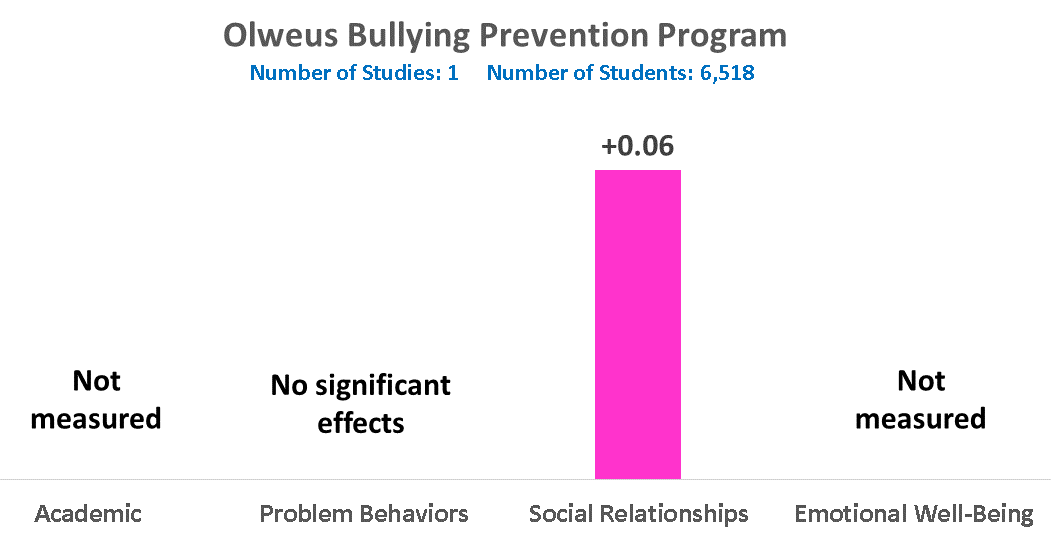
Program Description
The Olweus Bullying Prevention Program (OBPP) is designed for students in grades K-12, combining in-school programming for individuals, classrooms, and schools with community engagement in order to reduce bullying and improve school climate. The qualifying study, however, involved only middle schools. OBPP focuses on the response of onlookers to bullying events, so it involves all students. OBPP schools receive consultation from Olweus-trained district trainers prior to implementation. Staff form a school coordinating committee, and receive ongoing consulting support. The program includes materials for engaging with parents and community members, including holding events to educate parents on bullying issues, updates on bullying incidents, and classroom meetings.
Program Outcomes
Bauer, Lozano, & Rivara (2007) carried out an evaluation of OBPP in a matched study in a Seattle area district. Seven middle schools opted to implement the OBPP program, while three control schools opted to implement other less formal bullying prevention activities. The schools were 16% African American, 7% Hispanic/Latino, 24% Asian, 35% White, and 2% Native American. 48% of students in the study received free lunch.
The study used annual school district school climate survey data (integrated with Olweus survey questions) along with in-depth interviews with students. Effects on school climate met “Promising” criteria (ES=+0.06). While the study did not find differences in student-reported victimization, or student attitudes about bullying overall, it found a decrease in victimization among White students and a significant difference in students’ perceptions of others as actively intervening in bullying incidents.
Staffing Requirements
All staff are involved in bullying prevention efforts and use the program’s principles in daily interaction with students and other adults. The Olweus Bullying Prevention Coordinating Committee (BPCC) is a representative group from the school that serves as the leadership team for program implementation at the school. The committee meets approximately one hour per month. Additionally, the committee chairperson consults with the OBPP Trainer-Consultant for approximately one hour per month. Classroom teachers conduct class meetings to discuss bullying, peer relations, and other social and emotional issues with students. Class meetings should be held weekly by all teachers for grades K-8 and every other week for grades 9-12. Additionally, teacher representatives serve on the Bullying Prevention Coordinating Committee, as well as a building administrator and student services personnel. Additionally, they may be involved in follow-up discussions with students who were bullied, students who bullied others, and parents of students involved. Committee meetings are approximately one hour per month. A representative from support services personnel should serve on the Bullying Prevention Coordinating Committee. Additionally, all staff are encouraged to use a six step on-the-spot intervention when bullying is witnessed, suspected, or reported.
Professional Development/Training
A certified Trainer-Consultant provides a two-day training followed by monthly consultation to the school’s Bullying Prevention Coordinating Committee. The Committee then provide a full day training to the rest of the school staff.
Technology
Not required but print copies of the Schoolwide Guide and Teacher Guide come with CD-ROM and DVD or flash drive. Electronic versions of program materials are also available. The Olweus Bullying Questionnaire is available in a hard copy scannable, online, or interactive whiteboard version.
